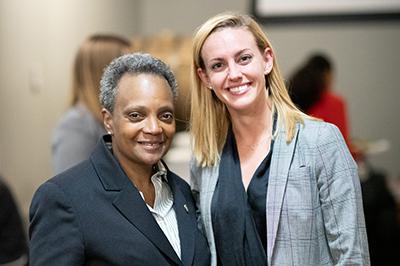Striving for a More Perfect Union
Educator, author, and politician Shirley Chisholm famously said, “If they don’t give you a seat at the table, bring a folding chair.” When she announced her candidacy for president in 1972, she offered the less-known but no-less-true sentiment: “I stand before you today, to repudiate the ridiculous notion that the American people will not vote for qualified candidates, simply because he is not white or because she is not a male.”

Taylor Raymond ’16 (left) and Chicago Mayor Lori E. Lightfoot.
The 19th Amendment was about more than suffrage; it was and continues to be women’s formal ticket into the political system. Women in this country have a rich history of political pursuits; and yet, 100 years later, we are still merely on the precipice of this country’s female story. In 1992, a record number of women were elected to the House of Representatives and U.S. Senate. It was the beginning of a seismic shift in politics, in the way Americans saw electability, and in how women saw themselves and each other.
We could win. And we have.
While we are still waiting for the highest office to be referred to as Madame President, we can count some big wins since 1992’s “Year of the Woman.” The 2018 elections saw women win 102 seats in the House, 14 in the Senate, and nine gubernatorial races. While there were also losses, these women are the shoulders that others can stand on to succeed.
Mayor Lightfoot inspires a city to believe that change is coming to them personally.
– Taylor Raymond ’16, advance associate for the City of Chicago Office of the Mayor
On the hyper-local level, Chicago’s Mayoral runoff election featured two black women for the first time in history. I am grateful to stand at the beginning of this new history with Mayor Lori E. Lightfoot. As the first Black female and LGBTQ+ mayor of a large city, her achievement is the culmination of hundreds of women before her that tried, failed, and tried again.
I have gained a unique perspective through the work I do as an advanced at City Hall, a role that, while perhaps not well known, is essential to the daily operations of most politicians. We have walked into neighborhoods so far south, the “Welcome to Indiana” sign is visible; we’ve spoken with folks that have lived in these neighborhoods who told us that a mayor had never come to their neighborhood. We have spent nights on the West Side with pastors, police commanders, and community leaders; we’ve spoken with mothers who have lost children to violence; we’ve guided youth who have seen their friends murdered or who have lost parents to the criminal justice system. We have attended corporate events in nearly every single skyscraper in the downtown area with business leaders big and small. What I have seen is one common thread—hope. Mayor Lightfoot inspires a city to believe that change is coming to them personally. It is not some abstract notion of a better city, but a better tomorrow for them.
We will strive to turn decades of systemic discrimination and economic injustice in Chicago into a prospering city that works for everyone. The policies that Mayor Lightfoot’s administration is implementing is part of the equation, but the other half comes from people who continue to be engaged, who go to the polls, who help candidates organize and run for office.
What we strive for, ultimately, is a more perfect union.
Taylor Raymond earned a Bachelor of Arts in Political Science in 2016. She studied abroad at Trinity College Dublin School of Law and completed an international field study of the Russian Diaspora in Latvia, Estonia. She joined the Mayor’s Office of Chicago in June 2019.

